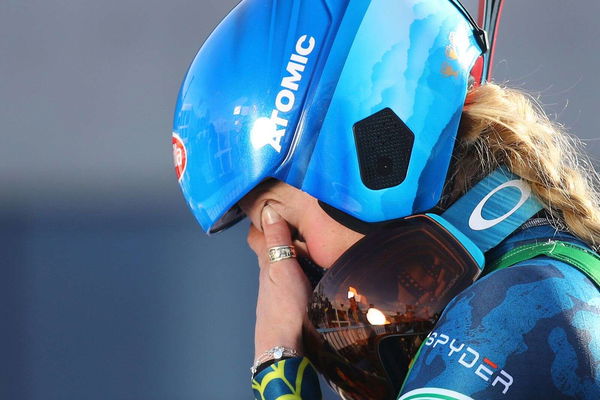

After her latest victory in Sestriere, Mikaela Shiffrin’s place in skiing history is no longer up for debate. The win also marked her 100 career World Cup win. The 29-year-old American led from start to finish in her trademark slalom event, finishing 0.61 seconds ahead of Zrinka Ljutic. With this win, Shiffrin also matched Ingemar Stenmark’s 155 career podium finishes, a record which seemed untouchable. But reaching this final peak wasn’t easy.
Her pursuit of a century was put on hold after a crash in Killington last November, where she suffered a puncture wound to her abdomen. It was just the latest in a series of brutal falls, including a six-week recovery stint after tearing knee ligaments in Cortina d’Ampezzo. The crashes were a reminder of how quickly skiing can take control away from even the best. It’s certainly one dangerous sport. But for Shiffrin, the toughest setback of her career had nothing to do with a race.
The hardest fall came in 2020 when she lost her father, Jeff. And for the first time, the mental toll of skiing wasn’t just about confidence or competition—it was about despair.
ADVERTISEMENT
Article continues below this ad
“Before Beijing [2022 Winter Olympics], I was talking with a sport psychologist, and it was helpful to a point. Honestly, I feel like my mom has been one of my greatest sport psychologists. She knows me better than anybody, so she helps me dive into the history of my mentality. It’s been tough to have consistent meetings, but I try my best to get sessions in when things are intense,” Shiffrin said to Self.
Continuing further, she said, “But the last couple of years, since my dad passed away, I felt like some of the challenges I faced mentally and emotionally existed outside of the field of sports. It was the first time that I started speaking with a clinical psychologist.” It’s not easy to lose someone when you look up to that person in your entire life. Unfortunately, it’s a moment in time we never wish to happen.
“It’s been extremely helpful for me to understand more about myself… learning how to communicate in a way that is clear and beneficial for all those working around me has also been a journey,” said Shiffrin.
View this post on Instagram
Shiffrin shared an extraordinary bond with her father, Jeff Shiffrin. More than just a parent, he was her mentor, biggest supporter, and guiding force. His sudden passing in an accident on February 2, 2020, while at home in Colorado, left a void that she continues to navigate, carrying his lessons and love with her through every race.
What’s your perspective on:
Overcoming grief and injury, does Shiffrin's journey redefine what it means to be a champion?
Have an interesting take?
Mikaela Shiffrin’s unbreakable bond with her father
The camera never lied to Mikaela Shiffrin. It captured her first wobbly runs, fearless descents, and first triumphs. And behind that lens? It always was Jeff Shiffrin—her father, the biggest fan and storyteller in still frames.
Shiffrin’s story isn’t just about golds at the Olympics (2), World Championships, or numerous other wins. It’s about the man who ensured she remembered how she got there. Jeff Shiffrin wasn’t just an anesthesiologist, who understood her art, but he knew when to click the shutter when others lowered their cameras.
“A lot of the photographers get like similar shots because they’re all standing in the same area,” Mikaela said to Today.Com. “But he knew when to take the picture when everyone else put their camera down. He’d keep his up.”
But then, in an instant, he was gone.

Jeff Shiffrin’s sudden passing in February 2020, because of an accident in Colorado, shattered Mikaela. The world saw her step away from skiing, but few knew the weight of the grief that kept her from even getting out of bed. “She couldn’t even get out of bed,” said her mother, Eileen Shiffrin to NBC in 2022. “She was so devastated. She couldn’t stop crying.”
Her brother, Taylor, wouldn’t let her slip away. “You cannot give up,” he told her, holding her and their mother close. “It was a moment of selfishness, like: ‘You can’t quit on us. We need you.’” He reminded her of their father’s resilience. “Yes, you need us but we also need you so we’ve gotta get back on our feet. It’s what Dad would want. It’s how Dad would handle it.” Words of encouragement became critical.
ADVERTISEMENT
Article continues below this ad
The determined Shiffrin returned to the slopes in 2022, but the victories felt different. “It was a little bit of a relief to win a race again,” she admitted. “I definitely had a lot of doubt about whether that was ever going to happen again, but there was a pretty big part of me that was kinda hoping I wouldn’t…” What can you say to someone who lost an inspirational figure? We don’t work like robots. We come with emotions.
And yet, something stirred in her, and that was a spark. “The one thing that was exciting is I felt a little hint of that fire that you have to feel to win races, and that’s a good feeling to have so definitely there’s a lot going on.”
Then, she found the photograph. The one picture of Jeff where he wasn’t behind the camera, but in front of it. The one that made her feel like he was still watching, clicking away, still saying, “I see you.”
ADVERTISEMENT
Article continues below this ad
“It was not that easy to find pictures of him,” Mikaela said, pointing to her father’s pic on the wall, “We wanted to feel his presence and sometimes it’s hard to force that, but we want to see him, and that’s nice.”
By 2025, Mikaela Shiffrin has rewritten records, amassed medals, and cemented her legacy. Yet, nothing fills the space her father left. She still feels him in every turn, every race, every victory. His love for skiing lives on through her. Well, her daddy must be proud after 100!
ADVERTISEMENT
ADVERTISEMENT
ADVERTISEMENT
ADVERTISEMENT


Overcoming grief and injury, does Shiffrin's journey redefine what it means to be a champion?